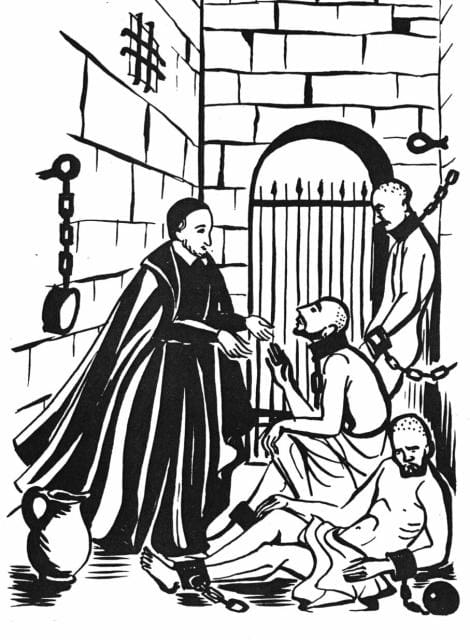In the article “Vincent de Paul and the Galleys of France“, Fr. John Rybolt, C.M. presents in horrifying detail the conditions of the galley slaves.
“It is unclear who first had the idea of using French criminals for service on the galleys [long and narrow ships, about three feet above the water line, propelled primarily by oars]— they were not slaves— but it developed during the 16th century in the time of Francis I as a kind of punishment, along with banishment from one’s home territory. The first law concerning using convicts for galleys dates from 1561, and in 1564, another extended the time of punishment to no less than ten years. This system powerfully affected Vincent’s ministry. As Henri de Maupas du Tour relates in his funeral oration: Vincent could not recount their suffering without becoming ‘bathed in tears,’ describing the prisoners as, ‘being covered with vermin and maggots.'”
“’Until the coming of the concentration camp, the galley held an undisputed pre-eminence as the darkest blot on Western civilization; a galley, shuddered a poetic observer, would cast a shadow in the blackest midnight.’ Although no French galley has survived, the words galère or galérien (a galley convict) continue in the French language as synonyms for any sort of brutal and rough conditions. It was in this system that the kindly Vincent de Paul, often portrayed simply as caring lovingly for abandoned children, began a new ministry. In his work, he dealt with human fuel, men who were used principally to power the ships, working until they could no longer do so because of illness or death, the most common reason.”

The convicts were held in inhuman confinement, in dungeons, before their transfer to the galleys. It is said that no one survived more than a month in these conditions. St. “Vincent located a building for rent in the city, and the convicts were transferred there. He often spent time with them and recalled in an undated letter: ‘I kissed their chains, showed compassion for their distress, and expressed sorrow for their misfortune.'”
When you have time, read the full article (fascinating history of the galley system and St. Vincent) here, in the Vincentian Heritage Journal. Perhaps as a Lenten exercise, ask yourself: What specific habits or sin-patterns are keeping me from being the person God intended, keeping me in slavery? What is stealing my freedom?
Vincentians: Called by God to Relieve Suffering
As Fr. Rybolt’s article explains, it was not only St. Vincent and the priests of the Congregation of the Mission who cared for the galley slaves; the Ladies of Charity and Daughters of Charity did as well, and Vincent drew up rules to guide them in their service.
Today in the U.S., the Society of St. Vincent de Paul has prison ministry programs and they aid ex-prisoners’ re-entry into society. More information at the following links:
Article about the re-entry program
SVDP USA Prison Ministry
“Christ was sent by the Father ‘to bring good news to the poor’… Similarly, the Church encompasses with love all who are afflicted with human suffering and in the poor and afflicted sees the image of its poor and suffering Founder. It does all it can to relieve their need and in them it strives to serve Christ” (Ecumenical Council Vatican II, Dogmatic Constitution Lumen gentium, 8).
Download PDF
Download PPT







0 Comments